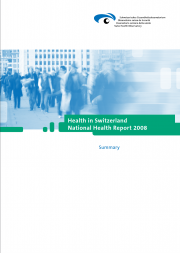Health in Switzerland - Summary
National Health Report 2008

In health care discussions of recent years it has often been assumed that many of the new chronic diseases are in the first instance triggered by individual behaviour. Research is now showing more and more conclusively, that an individual's health is also determined by external influences. These include socio-economic factors such as education, profession and income, as well as socio-cultural determinants such as gender, ethnic origin, or social status.
The Report “Health in Switzerland” describes for the first time the health of the population in the light of these social health determinants. Switzerland, following Sweden and Finland, is one of the first countries in Europe to take up this new concept. With this move, comes the conviction that a health policy has to provide more than a mere guarantee to care for sick people. A health policy should also contribute to shaping social conditions, so that as many people as possible have access to the health system resources. In so doing it will also be valuable in reducing health disparities. Such an approach shows that the objective of healthy life concerns not only health policy in the narrowest sense, but that this is a multi-sector task involving the accountability of many societal decision-makers.
The present report „Health in Switzerland - National Health Report 2008“, describes in five main chapters the topics which Swiss Health and Society Policy will be concerned with in the future.
This summary gives an overview over the most important topics and results of the National Health Report 2008.